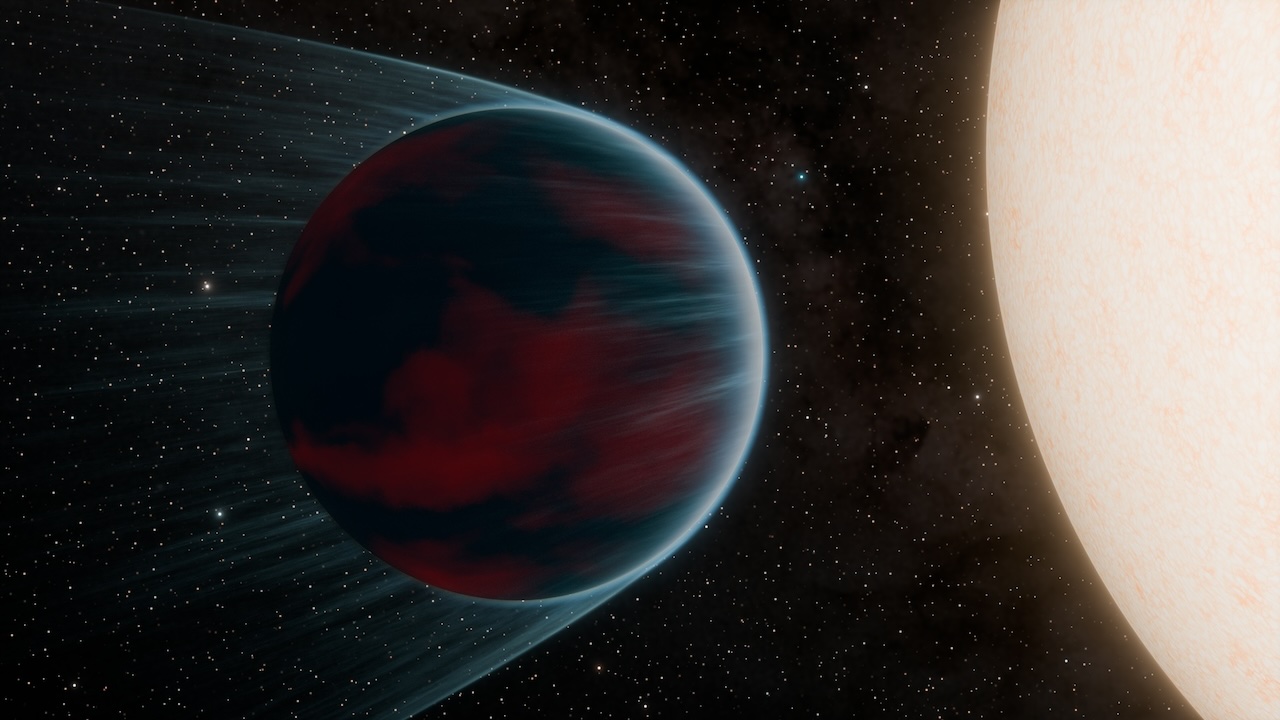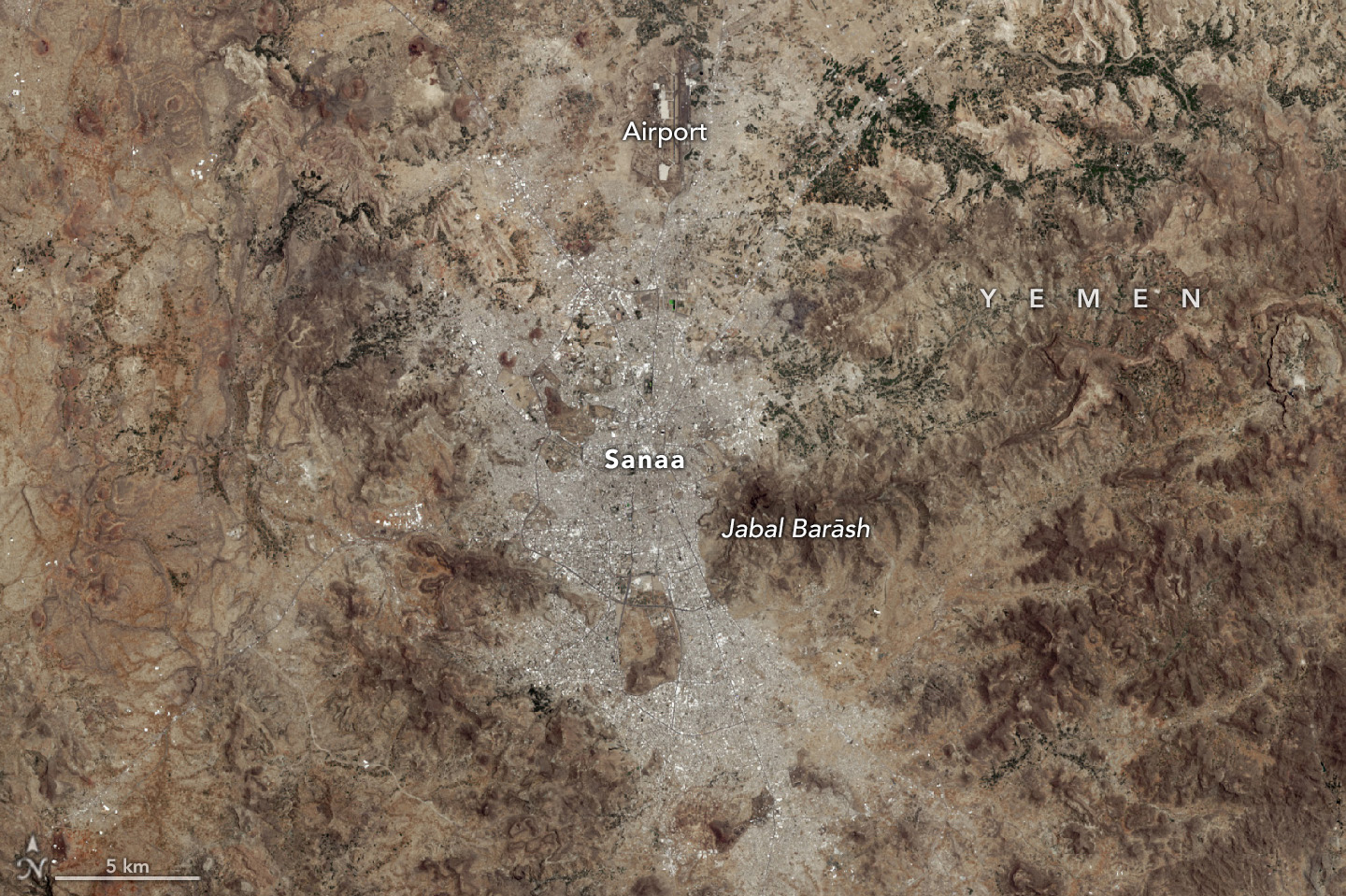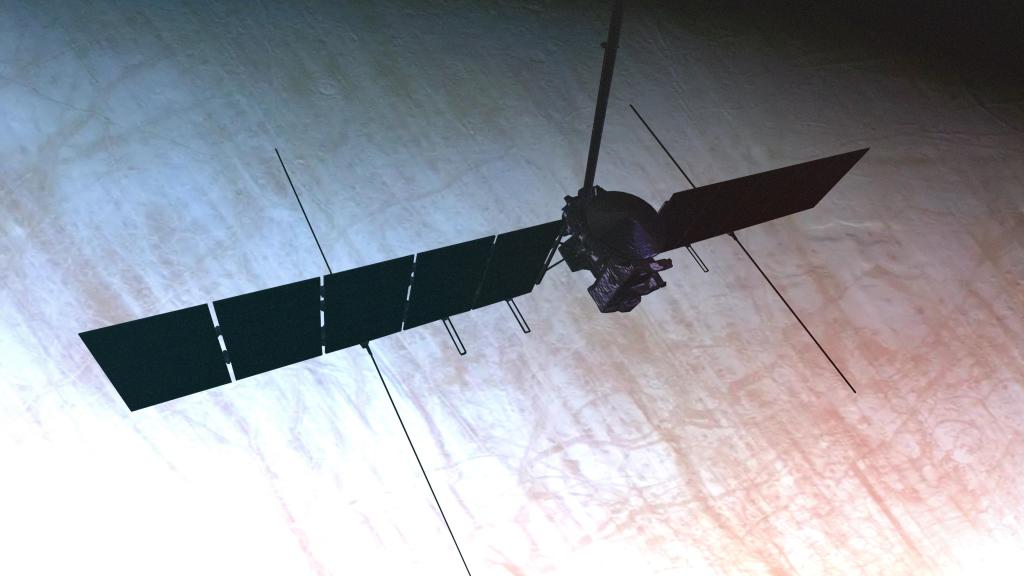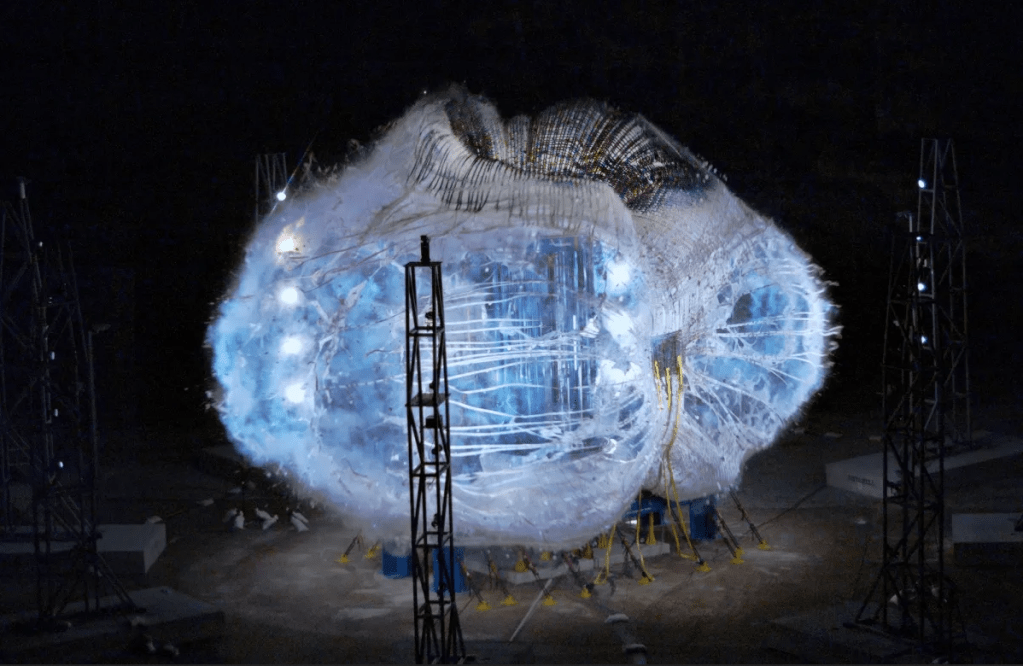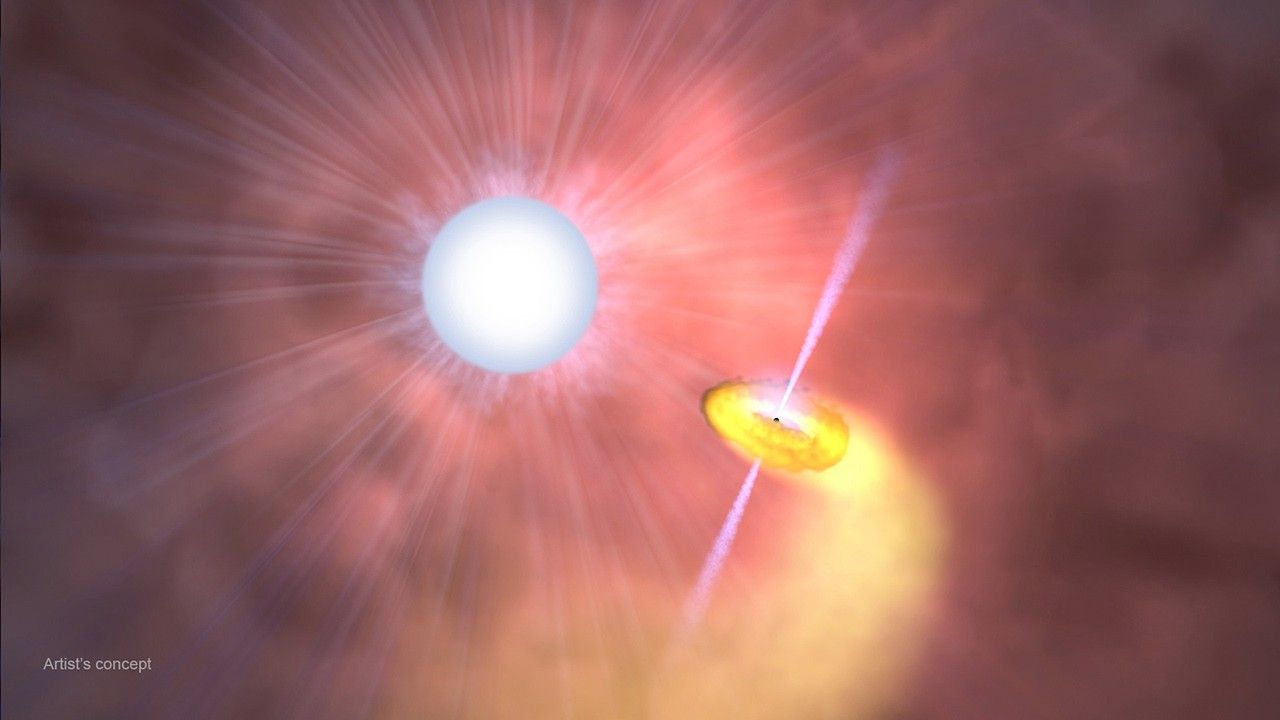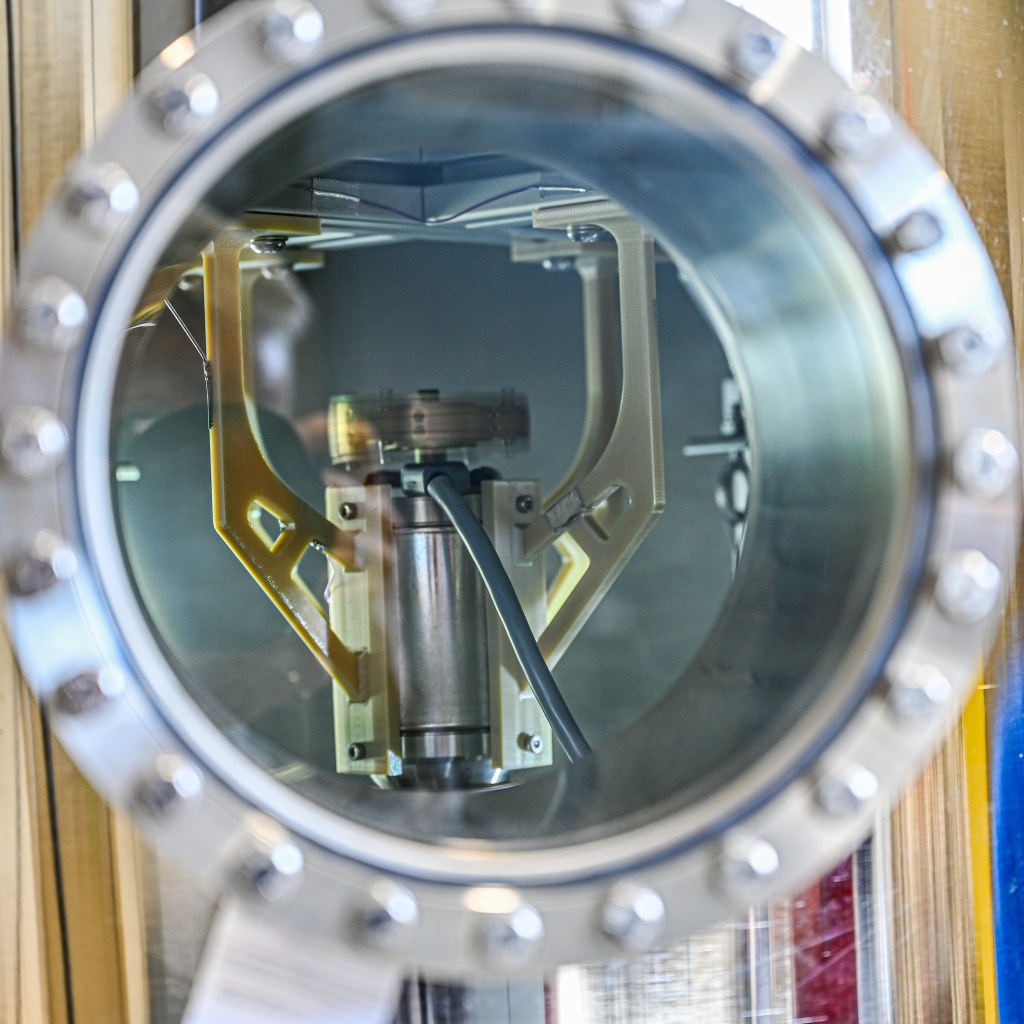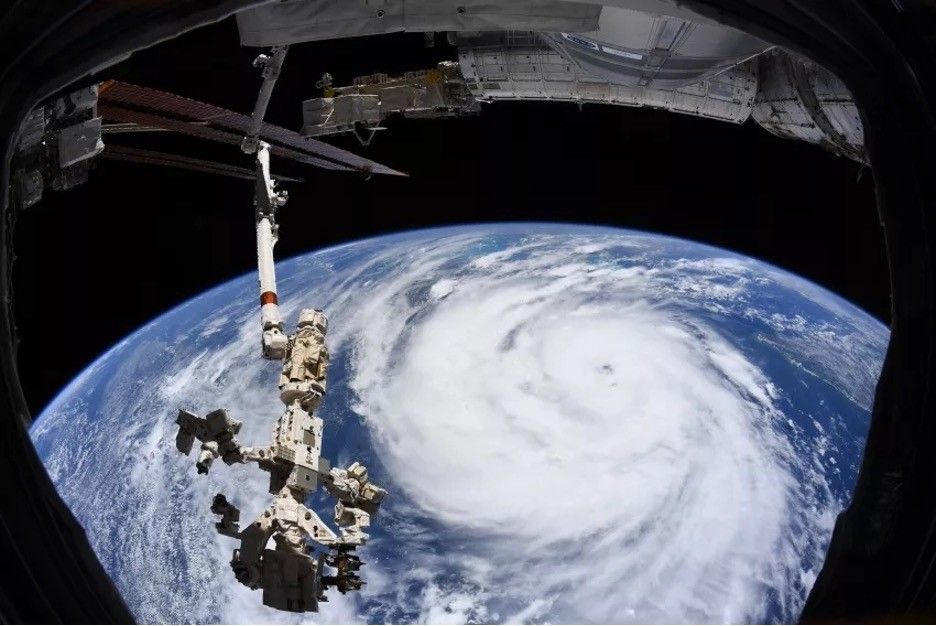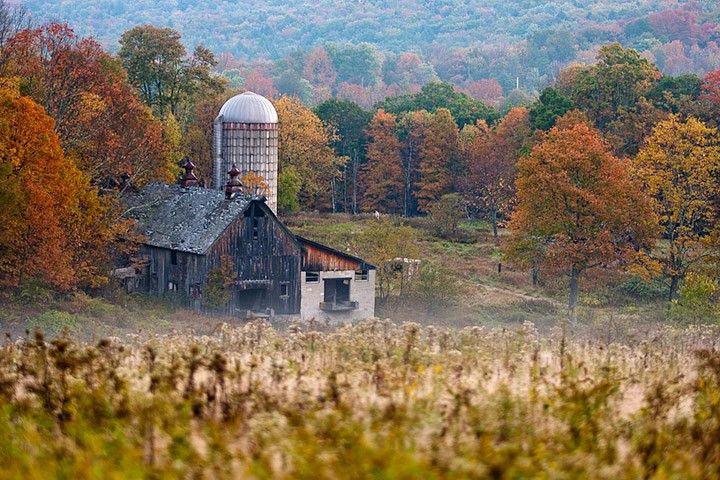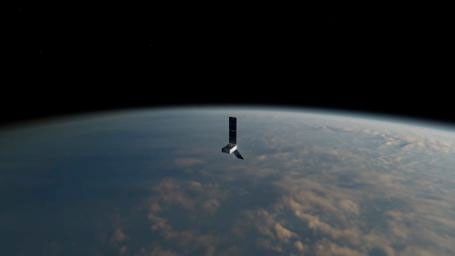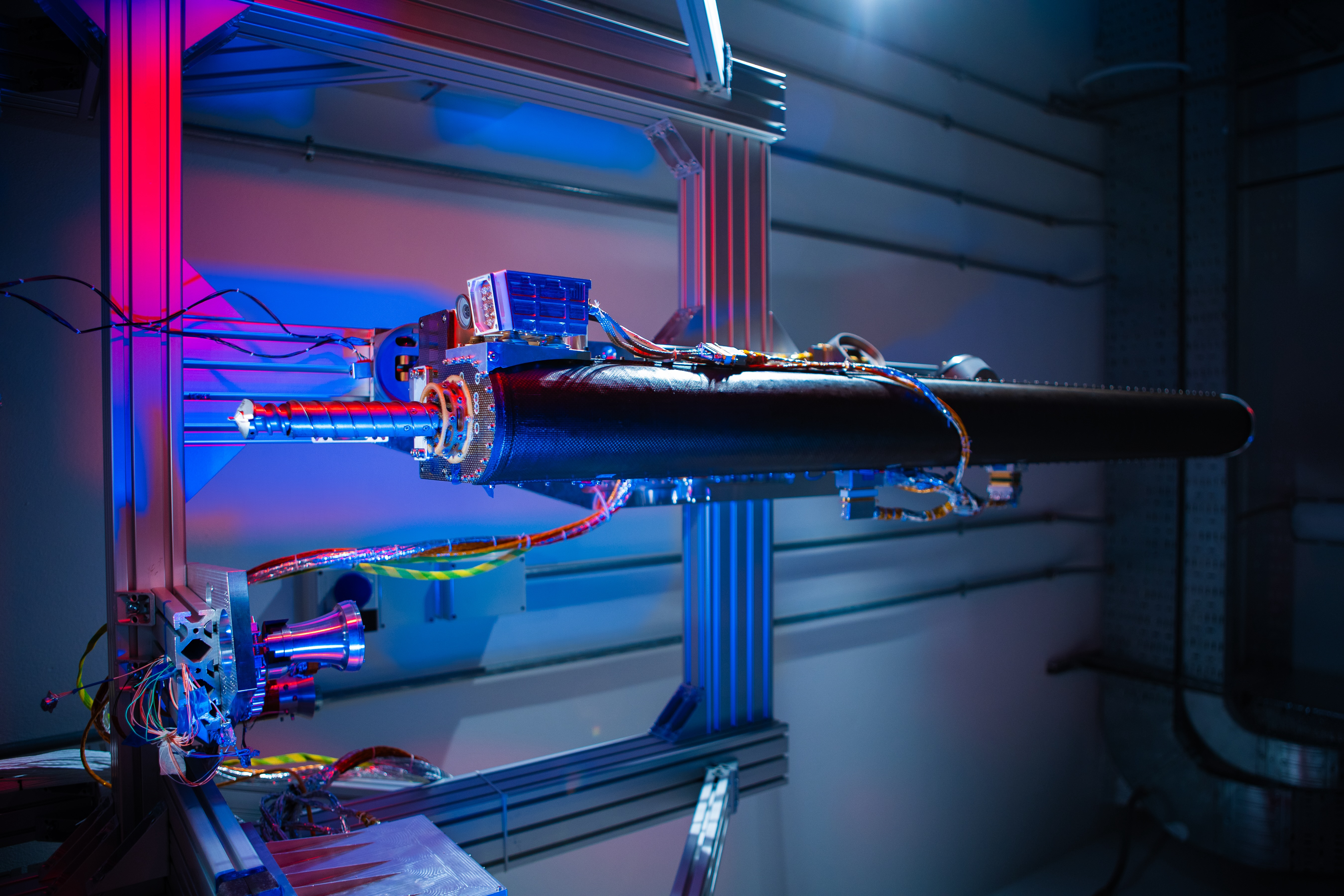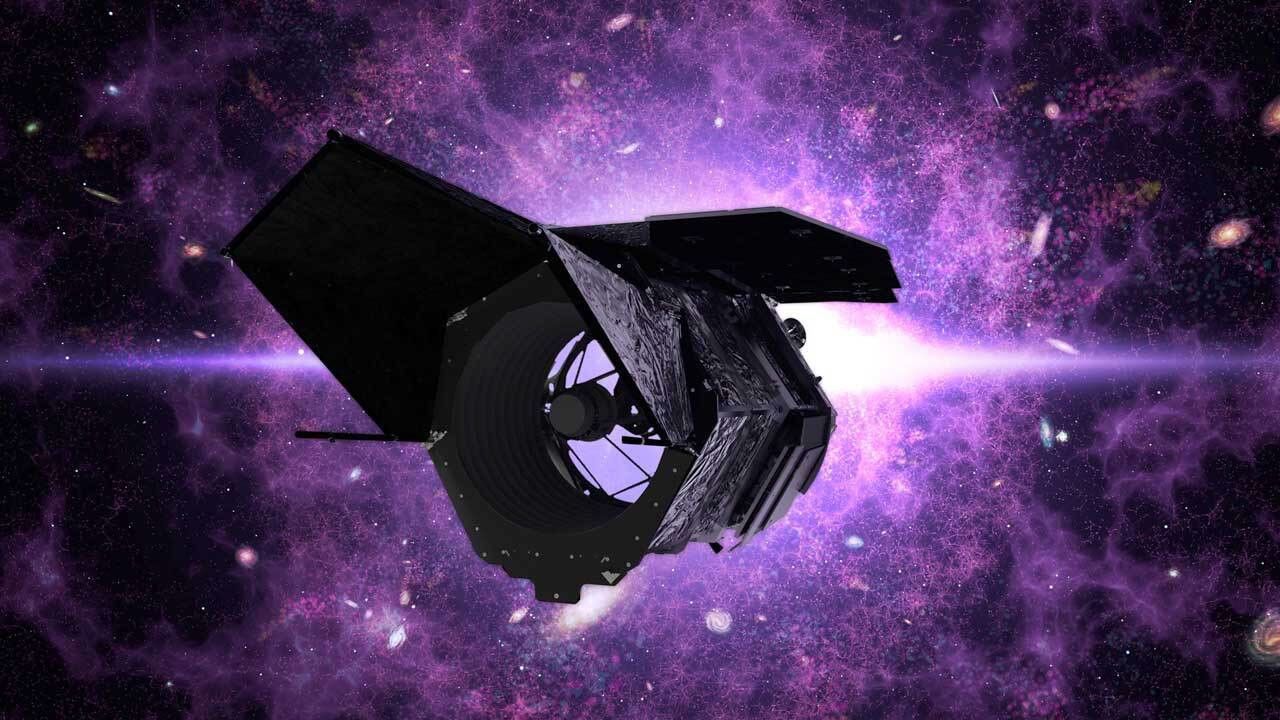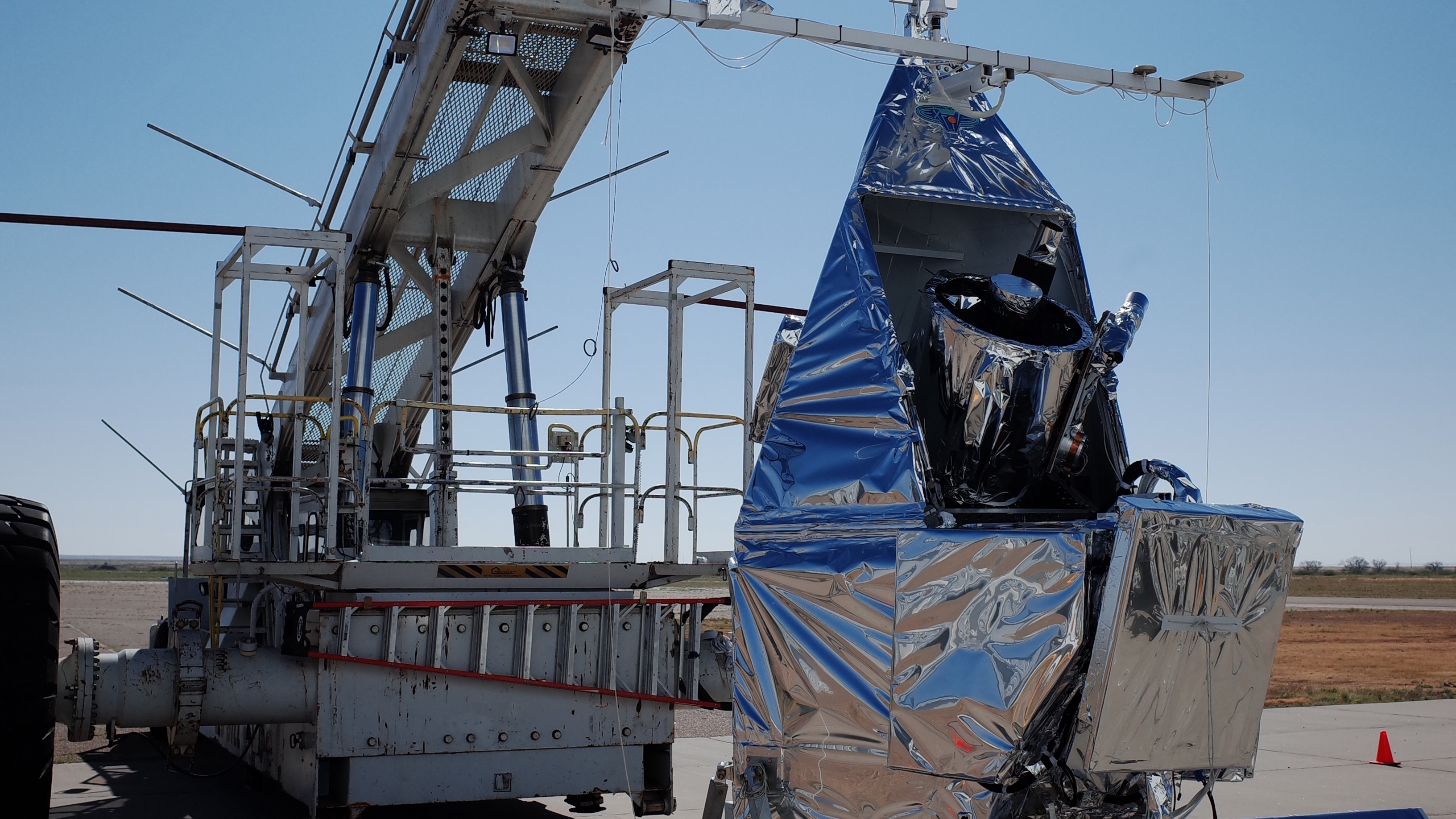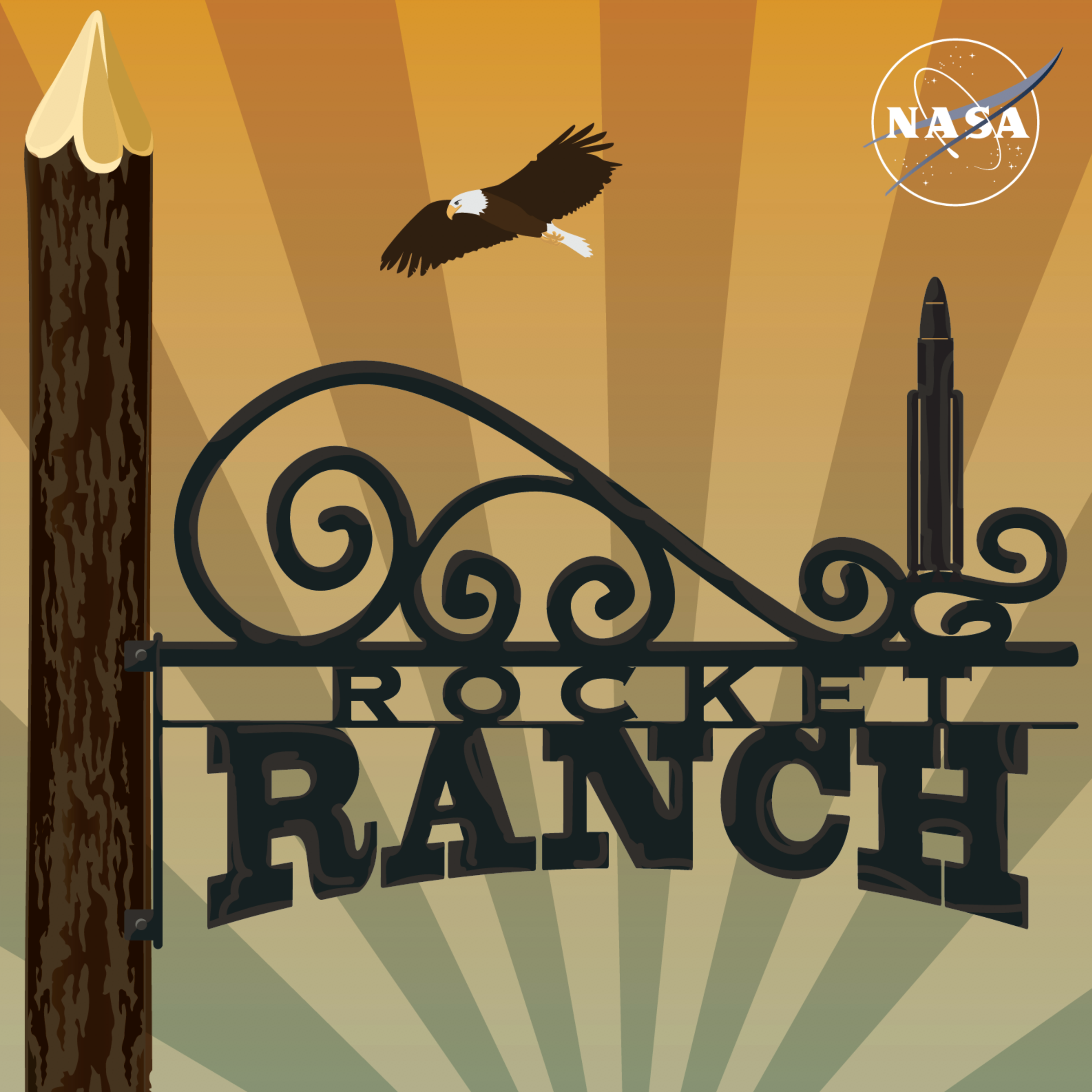
Joshua Santora: Every member of the NASA team is critical to our success, even if they’re still finishing school. Next on the “Rocket Ranch.”
Launch Countdown Sequence: EGS Program Chief Engineer, verify no constraints to launch.
3, 2, 1, and lift-off.
Welcome to space.
Joshua Santora: Today I’m in the booth with two summer interns that we rounded up. We thought it would be fun to catch them during their first week and get some first impressions. So, I am here now with Amber George and Peter Henson. Thank you all for joining me.
Amber George: Thank you for having me.
Peter Henson: Thank you for having me.
Joshua Santora: So, I want to just give you a chance to kind of introduce yourselves a little bit. So, tell me about — where are you from? Where do you go to school? What are you studying? And, yeah, we’ll start there.
Amber George: I’ll go first. I’m Amber George. I’m from Michigan. I’m from Detroit, Michigan. I attend the University of Michigan, and I’m studying naval architecture and marine engineering.
Joshua Santora: You said naval architecture?
Amber George: Naval architecture.
Joshua Santora: What does that even mean?
Amber George: The designing, building of boats.
Joshua Santora: Oh, really? That’s pretty cool.
Amber George: Yeah, but there’s more. There’s, like, offshore. There’s oil rigs. There’s a lot that goes into it.
Joshua Santora: That’s super cool.
Peter Henson: That’s cool.
Amber George: Yeah.
Joshua Santora: Awesome. Alright, Peter?
Peter Henson: Okay. So, hello, everybody. My name is Peter Henson. I’m from a small town in North Dakota called Carrington that’s kind of in the middle of nowhere, but, yeah, my background is in civil engineering. But, yeah, I graduated with a bachelor’s degree in civil, and then now I’m a master’s student at the University of North Dakota in Grand Forks. I am studying space studies, which is an interdisciplinary space degree. It kind of gives you a wide breadth of the different aspects of space exploration. It talks about space policy, space law, planetary science, observational astronomy, engineering, kind of all that, whatever you might need to know about space, not in too much detail, but kind of back-of-the-envelope stuff. So, yeah, that’s what I’m up to.
Joshua Santora: And so you finished a bachelor’s. Did you just like — “Man, I want more school”? Or was there another reason that you decided to go for a master’s?
Peter Henson: So, yeah, in my last year, my senior year in my undergrad, I was funded to do an undergraduate, like, aerospace fellowship through Space Grant Consortium, which is NASA’s kind of bucket of education. Or NAS–
Joshua Santora: It’s one of them. Yeah, it’s tough to explain.
Peter Henson: [ Laughing ] Yeah, yeah.
Joshua Santora: So go do some homework. Space Grants — they’re really cool. They’re all across the country.
Peter Henson: Right.
Joshua Santora: But, yes, I got you.
Peter Henson: Yeah. So, I did a little fellowship there, just kind of, you know, an undergraduate science project to kind of get me — see if I’m interested in space. And, I mean, yeah, you know, I was, so I kind of kept going with it, and that’s what brought me to the space studies program.
Joshua Santora: That’s awesome. So, both of you — a question for both of you — is this your first internship? And if not, what else have you done?
Amber George: Technically, this is my first internship. I worked last summer with Siemens PLM, and I kind of work with their marketing team. And I marketed — I helped market a CAD program that they were working on to my university and my project team.
Joshua Santora: Awesome.
Amber George: And that was — that was really cool. But this is my first technical internship.
Joshua Santora: That’s great. That’s great. So, that one was pretty purely communication?
Amber George: Mm-hmm.
Joshua Santora: And then this summer you’re doing some engineering.
Amber George: Yes.
Joshua Santora: Which we’ll come back to that in just a second. But, Peter, first internship or —
Peter Henson: So, I guess, can you clarify the question? Like, are you saying internship, like any internship? Or are we talking space specifically or —
Joshua Santora: Well, I count Amber’s ’cause she has one. So, I guess we’ll open it up. Like, yeah, I mean, you could probably answer that a lot of different ways.
Peter Henson: Okay, okay, okay. So, yeah, through the space studies program, we do have an inflatable lunar Martian analog habitat, where we simulate life on the moon or Mars. So, that has been something I’ve been involved in. I was actually — I got to be a crew member this last spring. We stayed in there for two weeks, and they did a lot of psychological studies. And it was kind of more of a feasibility study to see different modules coming together, like a greenhouse, an exercise module. So, yeah, it was — I’ve done that. I’ve done a little bit of high-altitude ballooning, which sounds kind of weird, but I was kind of like a — served as, like, an electrical engineer, kind of doing some DIY electronics and making some little instruments to fly little sensors and stuff. But, yeah, this is my first NASA internship, and I’m really excited to be here.
Joshua Santora: Okay, cool. So, let me ask you — again, both of you — what’s the one thing on your résumé that you feel like kind of helped get you this internship? Because it’s fairly competitive. So, just kind of your own personal take on that, what got you here.
Amber George: So, my university has project teams, and they span from electrical and robotics all the way through to some of the naval ones, where there’s, like, a concrete canoe, there’s a human-powered submarine. You know, we have the Hyperloop, the car teams. There’s literally so many different ones. And the one that I worked on was the Mars Rover team. And basically we…
Joshua Santora: Very cool. That is cool.
Amber George:…build, manufacture, we test. Everything that’s done for a regular Mars Rover, we do, and we take it to competition. And I’m almost positive that’s what got me this internship, only because what I’m working on here is an excavator.
Joshua Santora: That’s awesome. So, when you say competition, like, what does that mean, you took it to competition?
Amber George: There’s a worldwide competition where people build and test — college students, I mean, build and test and manufacture on all-student-led teams. And they come together, and they have the competition in Utah. There’s, like, a Martian — it’s like a Martian —
Peter Henson: Mars Desert Research Station?
Amber George: Yes, yes, the Mars Desert Research Station.
Peter Henson: Okay, I think that’s it.
Amber George: That’s where they have it at every year in Utah, and it’s huge. It’s amazing. And I think we took seventh place this year, which was, like, the best that we’ve done.
Joshua Santora: That’s great. Out of how many teams? Just ballpark me a number.
Amber George: Maybe 60?
Joshua Santora: Okay. That’s awesome. Congrats.
Amber George: Yeah, I think they only allow about 60 teams to actually get into the competition because not only do you have to be able to compete, but you actually have to be able to get in, so… [ Laughter ]
Peter Henson: Wow.
Joshua Santora: Yeah, that’s cool. Alright, so, Peter how about you? What’s the highlight from your résumé?
Peter Henson: So, I guess probably — Yeah, I am actually an Eagle Scout, so I think that’s probably my most impressive thing.
Joshua Santora: Listen, Eagle Scout seems to get anybody a leg up on the competition.
Peter Henson: Yeah. So, I mean, it’s — Really, yeah, I think that would be probably my most —
Joshua Santora: Okay.
Peter Henson: If you’re looking for impressive things or something, yeah. But, yeah, my internship is funded by the Space Grant Consortium, and I have kind of done work with some STEM outreach, just doing, you know, little STEM activities with elementary students in the area. And I think that’s why they thought I would be good for it or why they funded me. So, that’s — Yeah.
Joshua Santora: Cool. So, Peter, this is your first week here. You kind of walk in the door. I know you’re doing some chemistry stuff. But give me kind of a flavor of what you’re working on. And how does it feel to, like, be given, like, real work that NASA’s implementing in their programs?
Peter Henson: Okay, yeah. So, that is definitely a loaded question. [ Laughter ] So, the project I’m working on is called MARCO POLO. It stands for Mars Atmosphere and Regolith, Processor/Collector for Lander Operations.
Joshua Santora: That is just impressive in your first week to have that acronym down ’cause —
Amber George: So many acronyms.
Joshua Santora: Well done, well done.
Peter Henson: Thank you. Thank you. Okay. Anyway, but, yeah, it’s — So, and, I mean, Amber will maybe touch on this a little bit, too, later, but NASA’s goal is to go to the moon and Mars, right? And it is extremely expensive to buy tickets at the launch pad, right? I know a few years ago, it was like $10,000 per kilogram or something like that. We’re talking astronomically units of economy here. So, we want to be able to make whatever we can at Mars or on the moon. So our project is focused on making rocket propellant at the Martian surface solely with Martian resources. So, my specific job will be to freeze CO2 out of the Martian atmosphere. So, we have a simulated Martian atmosphere. I’ll be working with a cryogenic cooler to freeze CO2 ice.
Joshua Santora: So, no big deal. You’re, like, taking volatiles from the Martian atmosphere and using them to build things. [ Laughter ] That’s cool.
Peter Henson: Yeah. Yeah. Thanks. Thank you.
Joshua Santora: That’s awesome. Alright, Amber, how about you? So, you mentioned you’re working on an excavator.
Amber George: Yes.
Joshua Santora: Does it intimidate you to be like, “Hey, I did this back in my school, but this is actually one that NASA wants to put on the moon”?
Amber George: It actually doesn’t, only because I think, on the scale, it’s smaller than the one that we built. Also, it’s already done, whereas we had to build ours from scratch and we had to solder it. We had to mill it. We had to lathe it. We had to do — We had to build every single part.
Joshua Santora: Mm-hmm.
Amber George: And these ones are already done. Plus, I got to, on my first day, which was really cool — I got to see it actually in motion. It was amazing. So, yeah.
Joshua Santora: So, do you feel like, in 10 weeks, that you’ll really get to contribute a lot? Like, 10 weeks — it can sound like a lot of time and no time at all.
Amber George: I really hope so. As of right now, the project is already kind of — The ball’s already rolling on the project that we’re working on. And our mentors are going to a conference to kind of present this excavator in, like, a giant conference. So, when they get back, I believe we’re gonna start working, you know, full force, you know, all engines ahead on the project.
Peter Henson: Yeah. So, I guess my perspective on it — I just got here, but from what I’m seeing, it’s — Okay, I’m gonna step back here for a second. [ Laughter ]
Joshua Santora: That’s cool.
Peter Henson: Okay. So, I got paired with a chemical engineer, and from what I understand, she could probably do the work I’m doing, but, you know, they need help. There’s only so much time. So, I think, yeah, I would be making a contribution. You know, not one person can do everything. So, yeah, at least for my project, they’re, like, scaling it up and scaling it up to try to make it bigger and bigger. So, I’ll be running just tests on an already built system. So, yeah, I think I’ll be making a — it might be a small contribution, but, yeah, it’ll be a contribution.
Joshua Santora: Cool.
Amber George: Small contributions make large contributions.
Peter Henson: Yeah.
Amber George: They contribute.
Joshua Santora: Yeah. Such a good point. And I think it’s important, kind of, Peter, to what you just said, the reality of — there’s just a lot of work to do.
Peter Henson: Mm-hmm.
Joshua Santora: And things are moving faster and faster as we scale up more and more, getting ready for the future. So, remind me — what year are you, Amber, in school?
Amber George: Excuse me?
Joshua Santora: What year are you in school?
Amber George: Oh. I’ll be going into my fifth and final year.
Joshua Santora: Okay. Cool. And then, Peter, you’re in your master’s program?
Peter Henson: Yeah. I’m actually, like, in my third year. I’m about to finish it, yeah, soon.
Joshua Santora: So, you’re both in your early 20s. Peter, you’re helping us make useful things from Martian atmosphere. Amber, you’re helping us mine useful things from the dirt on the moon and Mars.
Peter Henson: Or is it Mars?
Amber George: It’s from the moon. Yeah, we have a lunar simulator where they have —
Peter Henson: Is that the regolith?
Amber George: Yeah. Yep. There’s like — Regolith is basically moon dirt for, like, layman’s terms, you know, moon dirt. And their simulator is a gigantic pit of regolith. And it’s loose. It’s very, very fine particles. It’s like sand, but finer.
Joshua Santora: Mm-hmm.
Amber George: And they’re a lot more — It’s a big dangerous because it’s so small and you could possibly breathe it in. So, it’s in a giant container.
Joshua Santora: Yeah. So, we actually have the world’s largest regolith pit…
Amber George: Yes.
Joshua Santora:…here at KC. So, we’re excited about that. Again, both of y’all, we appreciate you being here. We’re excited to hear from you. We’re planning to have you back in about 10 weeks, at the end of your internship, and we’ll kind of catch up with you and see how things are going and see what you were able to accomplish. So, thank you both for joining me. We appreciate you.
Amber George: Thank you.
Peter Henson: Thank you very much, Josh.
[ Tape fast-forwarding ]
Joshua Santora: So, we now have fast-forwarded about — what has it been 9, 10 weeks? So, we’re back again. It’s the end of summer. Peter, Amber, thanks for joining me.
Amber George: Thanks for having us.
Peter Henson: Thanks for having us, Josh.
Joshua Santora: Yeah. So, let me just kind of open it up to both of you. Like, give me, like, your general impression of the internship. So, thinking back 10 weeks ago to today, like, how has it lined up with your expectations? How do you feel about it? Just anything and everything.
Amber George: So, for me, I think that it really exceeded my expectations. A lot of times, internships for undergraduate students, you don’t get a lot of opportunity to do hands on or meaningful or real-life projects. And I got the opportunity to do that the entire summer, and it was amazing.
Joshua Santora: So, working on actual, like, NASA development projects…
Amber George: Yes.
Joshua Santora:…as an undergraduate student.
Amber George: Exactly.
Joshua Santora: Pretty cool.
Amber George: It’s not really all that common, so…
Joshua Santora: Outside of us. Here it is.
Amber George: Here it is.
Joshua Santora: Here it’s very common, which is nice. So, Peter, give me your take. How’s the summer been?
Peter Henson: Yeah, I would kind of — just kind of piggyback on that. Yeah, it was really cool to be able to meet a lot — I think that was my favorite part, was, like, meeting a lot of the full-time, you know, scientists, engineers, and technicians. That was really cool. And, yeah, for me, yeah, that was my favorite part. And I kind of expected it to be a lot of fun, but I didn’t really know how real it would be. Yeah, it definitely exceeded my expectations, yeah.
Joshua Santora: So, what’s that like, getting to meet the people who — this is their day job? Like, how’s that experience? Like, are they appreciative? Are they engaging? Like, how would you kind of rate the people around you in this world?
Amber George: In my experience, I say that they’re all very engaging. I think where I work in Swamp Works, everybody’s — it’s really fast-paced, and everybody’s moving and working, and, you know, there’s always something to do. And I really appreciate that. And they’re always willing to bring the interns in to help, even if it’s something small, like, “Help us move this so we can move something else in its place,” all the way down to, you know, “Can you help me, you know, brainstorm? Can you help me design, throw some things into CAD,” you know? I really appreciate that.
Peter Henson: Yeah, and I think it might come from them maybe being in our shoes at one point, so they see, like, hey, how we’re feeling. We might not know what to do sometimes. But, yeah, they were always kind of willing to help and just hear us out, which I was a little thrown off by, but very, like — very appreciative of. Yeah.
Joshua Santora: Good.
Peter Henson: That was awesome.
Joshua Santora: Peter, the most important question. You talked when we were here last time about being an Eagle Scout. Did that pay off this summer? Like, were you prepared? Were you ready?
Peter Henson: I felt fairly prepared. Definitely at times I was not prepared. I had got thrown into a position where I had to write a little bit of software, and I hadn’t really done a whole lot of that. But I had to work with a software engineer, which was actually really cool, and I was not really prepared for that. But, yeah, definitely the Boy Scouts — I definitely — That experience definitely helped out here, yeah.
Joshua Santora: So, you actually kind of got tossed into an interdisciplinary role, where you were doing multiple things.
Peter Henson: Yeah. Yep. So, yeah, I got to work with — I got to work with some mechanical hardware, some electrical hardware, and, yeah, some software all at the same time, which is — I mean, yeah, it was in Swamp Works, too, where Amber was, and it’s a little fast-paced. But that’s kind of, I think, the way it should be. We should kind of be kept busy and, you know, on our toes all the time, yeah.
Joshua Santora: Yeah, and I hope people are hearing that when we say busy, we don’t mean things like getting coffee or running errands. It’s like writing software and doing CAD. So, we pride ourselves on — on getting everything we can from you while you’re here.
Peter Henson: Yeah, yeah, yeah, yeah.
Amber George: I feel very utilized.
Peter Henson: Yeah, yeah, yeah.
Joshua Santora: There you go.
Peter Henson: That’s a good word.
Joshua Santora: And, Amber, I know you talked about thinking that your experience working on some robotics systems would come in handy this summer. Were you able to put those skills and that experience to practice?
Amber George: Oh, absolutely. A lot of the work that I did in school with the project team that I worked on is all very similar to a lot of the work that I did hear at Swamp Works, especially because they’re both for robotic rovers, which is really cool. And a lot of the CAD that I learned came in really, really handy.
Joshua Santora: So, kind of sum up for me, for both of you, what did you accomplish this summer? Like, do you have something that you finished or you can look back and say, like, “I did that, like, that happened because of me being here”?
Peter Henson: So, for me, we were working on this CO2 freezer project to try to freeze carbon dioxide out of Martian atmosphere. And the plan was to have the system kind of already built and then just test it, but all things are kind of a little slow here sometimes, which can happen. And it wasn’t actually finished built, so we were kind of working on getting it all put together. And then, yeah, we did run a couple tests. And, yeah, the interns produced an abstract, and that was kind of our deliverable. But, yeah, we were doing little hands-on things here and there. So, that was kind of what we brought to the table. I feel like most of the interns pretty much did that kind of thing, I think. Yeah.
Amber George: So, the project that I did was to create hardware for a reduced-gravity flight, and we did it. And the timetable for that was very, very stringent. Honestly, it was so gratifying once we finished it. And we got it done on time, and it worked and everything. And the flight for that was supposed to take place about two or three weeks ago, but it got pushed back to November. But I finished it… [ Laughter ]…on time.
Joshua Santora: Cool, cool, cool, cool. Hey, listen, that’s all you can do, right? You got to do your piece and make sure it’s done well and done on time. So, tell me about your perspective on this internship and kind of the real-world experience versus school. Like, does it change the way that you view school? Does it change kind of your focus going back to school? What’s that like?
Amber George: I think that going back to school — Since this is my last year and I’m going to start applying, you know, for full-time jobs, it’s helped me a lot with my focus on what I want out of, you know, the next year, the next two years of my life and where I want to be once I do step into a real career position. I think before this internship, a lot of what I did in school was obviously focused on coursework, whereas this was more of a hands-on, real-world experience. So I now have, like, the comparison, which is something I didn’t have before. And school felt very definite. It felt like, “This is something I’m gonna be doing forever,” mainly because I have been doing it for all of my life.
Joshua Santora: Oh, interesting. Yeah.
Amber George: Yeah.
Joshua Santora: So, what’s that comparison like? You’ve said that, like, you kind of have those to compare now. So, how do you view each? Like, and how do they work together?
Amber George: I think that a lot of what I’ve learned in school has helped me pick up tools to apply to, you know, a full-time position. And it’s actually a lot easier than I initially thought.
Joshua Santora: Mm.
Amber George: So, being able to apply what I’ve learned in school here was fairly easy. But the other way around, it always seems really hard, mainly because, before, I didn’t have that — I didn’t have that to compare to. Do you know what I mean?
Joshua Santora: Yeah, that makes sense.
Amber George: Yeah.
Joshua Santora: Makes sense. So, let me pry a little bit. You kind of said you now have a picture for the next couple years for you. So, what does the next couple years hold for you? What’s the plan?
Amber George: So, my personal plan for the next couple of years — if I can, I’d like to work at NASA.
Joshua Santora: Okay. Alright.
Amber George: But if I can’t work at NASA or, you know, if it’s just kind of — The process is really long, and it’s kind of tedious. If not, I see myself in a full-time position possible for an aerospace company, if not for a marine company. And I’d like to be working on my master’s.
Joshua Santora: Great. And I’m — So, NASA — we’re more than just the Kennedy Space Center. We have 10 centers across the country. So, have you looked at, where do your personal goals and your personal interest line up across the NASA centers? ‘Cause obviously there’s a lot of work going on other than just Swamp Works.
Amber George: Yeah. It’s funny you ask that. A lot of visitors from Johnson actually came, and they visited our lab. And they have lots of projects that they like to do in collaboration with Swamp Works. So, say if I weren’t able to land a Swamp Works, I think Johnson would be a good place. They do lots of work with ISRU, as well, and JPL.
Joshua Santora: Cool. Yeah. Good spots for sure. Yeah, there’s no wrong answer there, so just was curious of your thoughts.
Amber George: Oh, of course.
Peter Henson: Yeah, I can go back to the whole school thing.
Joshua Santora: Yeah, tell me about it.
Peter Henson: Yeah, I think, like, going — Like, when you’re in school, you kind of have, like, a lot of things going on at once. And I think when we’re here, we kind of get to be able to focus on, you know, maybe just one or two or three different things. So, I think having the experience of being kind of like really stressed out over, like, a lot of different things, going through that experience and getting to that, then going to, you know, maybe or two projects where you can kind of focus all your time on that — I think that’s kind of how school has paid off for me. And I think some of the interns might agree with me there, too.
Amber George: I do for sure.
Peter Henson: Yeah. What was the next thing?
Joshua Santora: Well, so, kind of thinking about the future, Peter, was kind of the next question, thinking about you. Like, how does this experience kind of — how does that orient your mind, as far as things you’re thinking about, things you’re looking at? Because working on Martian vehicles is not for everybody. Like, we definitely know that. So, certainly, like, there’s no requirement to do that with your career, but just curious — like, what are you thinking about now?
Peter Henson: Yeah. I think it’s really cool how NASA works. Like, there’s a lot of pieces to, like, a big puzzle, like you’re saying, over across different — like 10 different NASA centers. They’re all working on different things, whether it’s biology, engineering, or science, whatever. But I really like what’s going on here at Kennedy with the ISRU, trying to make and develop technologies to create resources at the moon or Mars without having to bring it from Earth. So, I think that’s really what I’m kind of interested in, and that’s kind of what’s going on here at Kennedy and a little bit at Johnston and a little bit at Ames in California.
Joshua Santora: And a little bit at Glen, like, that’s happening everywhere.
Peter Henson: I guess it is kind of a little bit everywhere, but that’s kind of the main focus here, is what I’ve kind of been seeing. And, yeah, I would like to come back here if possible. That would be kind of my dream. And I’m gonna keep applying for, you know, the NIFS and the Pathways, yeah. So, that’s kind of what I’ll be up to. But I would like to go back home for a little bit, back to North Dakota.
Joshua Santora: Yeah, for those that may not know, NIFS is a term — NASA Intern, Fellowship & Scholarship. That’s kind of our blanket internship opportunities. You can find those online. And then the Pathways program is actually — It’s formally called a co-op. It’s kind of a long-term internship. You can find more about that on usajobs.gov. But getting back to our topic at hand, you both kind of alluded to the idea that school feels harder than the internship. Is that a fair assessment of what you both said?
Amber George: Absolutely.
Peter Henson: I think so, yeah. I feel like in school you don’t really have a lot of time to prepare for problems that are a little bit challenging and kind of get their own — And, I mean, it’s kind of the same thing here, too, but you get a little more time ahead of time. You know, you’re applying. You’re thinking about the project for a while, and you’re getting a little more prepared. So, yeah, I definitely think that’s the case.
Amber George: For me, it feels like school kind of pulls you in lots of different directions. And it’s a lot more demanding. And to me, it just seems a bit more tedious. Maybe that’s a better word. It’s a bit more tedious, whereas in a real-world setting, everything’s a bit more fluid, you know? You work. You do your job. You complete your projects. Sometimes you don’t. Sometimes they get moved. Sometimes they get canceled. That’s —
Joshua Santora: Yeah, that’s really honest, yeah.
Amber George: You know, that’s like the — that’s the theme here. But it’s a lot less — it’s a lot less tedious than real school. Regular school, I mean.
Joshua Santora: Yeah, and I think you’re both kind of — Hopefully people hear in your voice that it’s a little bit hard to articulate, which I think makes sense.
Amber George: Yeah.
Joshua Santora: It’s a very different thing to be in school versus here. And obviously nobody here is gonna claim that everything we do is easy.
Amber George: Yeah.
Joshua Santora: But when you kind of — Like you’ve said, you kind of break it down into your project, your piece of the puzzle, and then you get to focus on that, which is really, really great.
Peter Henson: Mm-hmm.
Joshua Santora: So, I want to kind of open it up to you and ask you about, like, memorable experiences ’cause obviously, like, we talk about, like, the day-to-day work about things that you’ve done, but as you leave this place, what are the things that will stick out that you’ll tell friends about, that you’ll remember for a long time? What are those moments like?
Amber George: I have three, actually.
Joshua Santora: Okay, let’s go quick.
Amber George: Okay. Briefly. I got to drive the robot, which was the coolest thing I’ve ever —
Joshua Santora: Which robot? ‘Cause there’s a bunch of robots.
Amber George: RASSOR.
Joshua Santora: RASSOR.
Amber George: The large robot.
Joshua Santora: That’s right. So, if you’re interested, look that up — R-A-S-S-O-R. It’s a pretty cool robot. It will be a lunar excavator someday.
Amber George: We’re hoping. I got to drive the robot. I got to see two launches, which were amazing. And I finished my project on time.
Joshua Santora: So — and this will be a question for both of you ’cause you both got to see some launches — how — Can you describe, like, the difference in watching a launch on TV versus being here in person? Like, can you put words that?
Peter Henson: No. [ Laughter ]
Amber George: It’s more sensory. Like, it’s just so much better. It’s louder. It’s cooler. You can see it all the way through.
Peter Henson: It’s bright.
Amber George: It’s so bright.
Joshua Santora: Yeah, if you catch a night launch, they’re especially bright.
Amber George: We got to see a night launch and a morning laun– or a daytime launch, and they’re like — they’re so cool.
Peter Henson: Yeah, the Falcon Heavy that was at night — when it lit up, it kind of turned the sky, like, into day.
Amber George: It looked like a mini sun.
Peter Henson: Yeah, it was —
Amber George: It was really, really crazy.
Peter Henson: Yeah, it was so cool. And then the landings.
Amber George: The landings are very loud.
Peter Henson: Yeah. Yeah. After they land, it takes — I don’t know — like a few seconds — or a minute or some sec– a couple minutes, and then, yeah, the sonic boom. And that’s really loud.
Amber George: I think my favorite part is kind of watching it curve as it gets, like, to, like, optimal height, I suppose.
Joshua Santora: Mm-hmm.
Amber George: And it’s like, “Oh, the world is round, right?”
Joshua Santora: That’s right. You can’t just fly straight up. You have to start arcing over at some point.
Amber George: Yeah.
Joshua Santora: That’s awesome. And congrats on getting your project done on time, Amber. That’s fantastic.
Peter Henson: Whoo!
Joshua Santora: So glad to hear that. Alright, so, Peter, how about you? Things that are memorable, that stand out.
Peter Henson: One of my favorite moments was — It was just yesterday. We were in the cryogenics test lab, where we did a lot of work. And, yeah, we were kind of playing with liquid nitrogen a little bit.
Joshua Santora: We say the term “playing” very, like, safely, for the record. Everything is very safe.
Peter Henson: Yeah, everything was under control.
Joshua Santora: Yeah.
Peter Henson: And, yeah, we made some ice cream, kind of like Dippin’ Dots. We were kind of freezing some things and kind of breaking them a little. And, yeah, that was a lot of fun. It was just — I really liked getting together with all the interns whenever we’d kind of get together for whether it would be pictures or just doing kind of — There was a couple team bonding things. I really liked getting together like that, kind of like in a class or, you know, a team. Yeah, I love that. So, those were a couple of mine.
Joshua Santora: So, last question for you — does that kind of add to the experience, just kind of like that — almost like a camaraderie among interns, that you know that you all are here, kind of doing the same thing at the same time?
Amber George: Oh, absolutely. I just celebrated a birthday and —
Joshua Santora: Happy birthday.
Amber George: Thank you.
Peter Henson: Whoo!
Amber George: And so many interns came all the way to Orlando to celebrate with me…
Joshua Santora: Oh, cool.
Amber George:…because that’s where I was. And some of them even drove back the same night. Some of them — You know, we all got hotel rooms. I haven’t known them very long, and they were all willing to come and help me have a great time. And I really appreciate that. There was lots of camaraderie amongst me and all the interns.
Peter Henson: Yeah. That’s my favorite part, kind of feeling like you’re a part of something. We’re all here kind of for the same goal, you know, or working to try to get to space. And, you know, we have our own little roles here and there, and they’re all different, you know, but — Yeah, that’s the best part.
Joshua Santora: Awesome. Well, Amber, Peter, best of luck to you both. Thank you for being here, and look forward to seeing you again out there, being successful someday, hopefully as a co-worker here at the Kennedy Space Center.
Amber George: Thank you.
Peter Henson: Thank you very much.
Joshua Santora: I’m Joshua Santora, and that’s our show. Thanks for stopping by the “Rocket Ranch.” And special thanks to our guests, NASA interns Amber George and Peter Henson. To find out more about NASA internships, visit intern.nasa.gov. To learn more about everything going on at the Kennedy Space Center, go to nasa.gov/kennedy. Check out NASA’s other podcasts to learn more about what’s happening at all of our centers at nasa.gov/podcasts. A special shout-out to our producer, John Sackman, our soundman, Lorne Mathre, and our editor, Michelle Stone, and special thanks to Priscilla, Gwen, and Kathleen for setting things up for us. And remember, on the “Rocket Ranch,” even the sky isn’t the limit.

